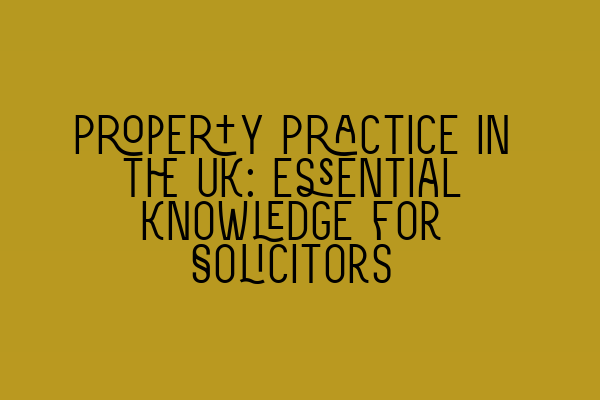Property Practice in the UK: Essential Knowledge for Solicitors
As a solicitor practicing property law in the UK, it is crucial to have a solid understanding of the legalities and intricacies involved in this area of law. Whether you are a seasoned professional or a newly qualified solicitor, staying up-to-date with the latest developments and possessing the essential knowledge is vital to providing quality legal services to your clients.
In this article, we will delve into the fundamental aspects of property law practice, including key concepts, procedures, and considerations that every solicitor should be well-versed in. So, let’s get started!
The Basics of Property Law
First and foremost, it is essential to have a comprehensive understanding of the basic principles and concepts of property law. This includes knowledge of property rights, the different types of property (such as freehold and leasehold), ownership and possession, as well as the legal framework governing property transactions.
Property law practice also involves being well-versed in the various legal documents that are used in property transactions, such as contracts, leases, and mortgages. Understanding how these documents operate and affect the rights and obligations of the parties involved is crucial in providing effective legal advice and assistance.
Conveyancing Process
A significant part of property law practice involves conveyancing, which is the process of transferring legal ownership of property from one party to another. Familiarity with the step-by-step conveyancing process is essential for solicitors dealing with property transactions.
The conveyancing process typically includes activities such as conducting searches and due diligence, drafting contracts, negotiating terms, arranging property surveys, and handling the exchange of contracts and completion. Being well-versed in these procedures allows solicitors to guide their clients smoothly through the property transaction and ensure compliance with legal requirements.
Landlord and Tenant Law
Another crucial aspect of property law practice is landlord and tenant law. This area of law governs the rights and responsibilities of both landlords and tenants in the UK, covering a wide range of issues, from tenancy agreements to eviction proceedings.
Solicitors practicing in this area must have a solid understanding of the key legislation, such as the Housing Act 1988 and the Landlord and Tenant Act 1954. They must also be familiar with the different types of tenancies (such as assured shorthold tenancies and commercial leases) and have the expertise to handle disputes and negotiate lease terms.
Real Estate Financing
Property law practice often involves advising clients on real estate financing matters, such as mortgages and loans. Solicitors must be knowledgeable about the legalities surrounding these financial transactions, including the creation and registration of mortgages, loan agreements, and the enforcement of security interests.
Understanding the implications of real estate financing on property ownership, rights, and obligations is crucial in providing comprehensive legal advice to clients. Solicitors must also keep themselves updated with any changes to lending regulations that may impact their clients’ interests.
Professional Development
In order to excel in property law practice, solicitors must commit to continuous professional development (CPD). Staying up-to-date with legal changes, attending relevant seminars, workshops, and courses, and participating in accreditation schemes, such as the Solicitors Regulation Authority (SRA) Continuing Professional Development Scheme, are vital for providing the best possible legal service to clients.
Additionally, preparing for the Solicitors Qualifying Exam (SQE) is important for solicitors seeking to enhance their knowledge and credibility in property law. SQE preparation courses, like those offered by SQE Property Law & Land Law, provide comprehensive training and practice materials to help solicitors succeed in the exam.
In conclusion, property law practice requires solicitors to possess essential knowledge and expertise in various areas, including property rights, conveyancing, landlord and tenant law, real estate financing, and continuing professional development. Staying ahead of legal developments, seeking continuous learning opportunities, and preparing for the SQE exam will ensure that solicitors are well-equipped to serve their clients efficiently and effectively.
For further resources and support, check out the following related articles:
